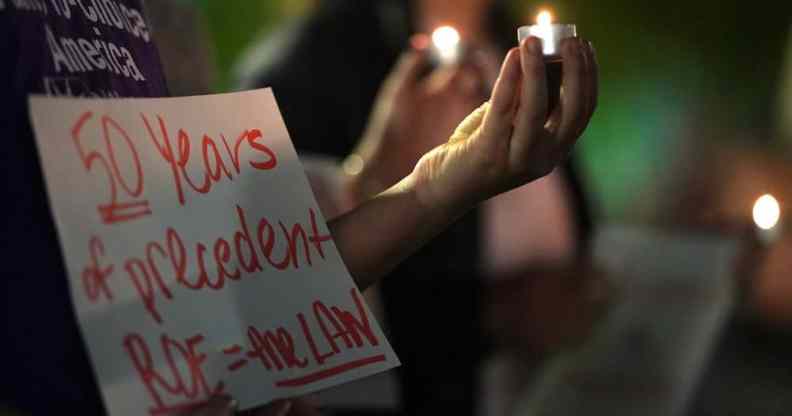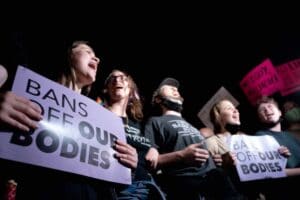If Supreme Court guts abortion rights, marriage equality, contraception and gay sex could be next

Protesters gather at the US Supreme Court in Washington, DC, on 2 May, 2022, following the Politico leak. (AFP via Getty/ STEFANI REYNOLDS)
The overturning of Roe v Wade could spell disaster not only for abortion access, but for reproductive freedom and LGBT+ rights.
On Monday night (2 May), a Supreme Court draft opinion penned by Justice Samuel Alito was published by Politico, an unprecedented leak which marked the first time that an opinion on a pending case has been made public in modern history.
Labelled as a first draft majority opinion in the case currently challenging Mississippi’s ban on abortion after 15 weeks, it called for the overturning of the 1973 decision Roe v Wade, which guaranteed the right to an abortion in the US, as well as the 1992 decision Planned Parenthood v Casey, which banned imposing “undue burden” on a person’s right to abortion.
22 states would immediately ban abortion
According to analysis by the Guttmacher Institute think tank, there are 22 US states which would immediately ban abortion upon Roe and Casey being overturned.
These include states that still have bans on their books from before Roe v Wade, and those who had “trigger bans”, which are ready to go into immediate effect if the 1973 decision is undermined.
These states are: Alabama, Arizona, Arkansas, Georgia, Idaho, Kentucky, Louisiana, Michigan, Mississippi, Missouri, North Dakota, Ohio, Oklahoma, South Carolina, South Dakota, Tennessee, Texas, Utah, West Virginia, Wisconsin and Wyoming.
A further four states are likely to ban abortion quickly if Roe is overturned, because of their “political composition, history and other indicators, such as recent actions to limit access to abortion”, according to the Guttmacher Institute.
These states are: Florida, Indiana, Montana and Nebraska.
NARAL Pro-Choice America noted in a press release: “These bans and attacks on abortion access fall hardest on those most marginalised, including people of colour, LGBT+ people, people with low incomes, and those in rural communities.”
Supreme Court
1:32am
May 3, 2022 pic.twitter.com/WJpRuEN3s4
— Charlotte Clymer 🇺🇦 (@cmclymer) May 3, 2022
The overturning of Roe v Wade would impact more than abortion rights
If the US Supreme Court rules that the right to abortion is not protected by the US constitution, reproductive rights and LGBT+ rights could be next in the firing line.
Of course, the overturning of Roe v Wade would immediately impact America’s LGBT+ community, because queer folk need abortions too.
Abortion bans result in forced pregnancy, which can endanger a pregnant person’s mental health and physical health, push them into poverty, homelessness or food insecurity, or even kill them.
In response to the leak, Equality California said in a statement: “Abortion is healthcare. Abortion is essential. Abortion is a fundamental human right.
“There is nothing the Supreme Court can do to change that. There is nothing five or six justices can do to stop people from needing and seeking abortion care. What they can do — and what overturning Roe will do — is cost people their lives and livelihoods. Women. Transgender and non-binary people. Our mothers and sisters and friends and neighbours and colleagues.
“Shame on us if we let this stand. We must organize, mobilise and vote like our lives depend on it. Because they do.”

Protesters link arms as they gather at the US Supreme Court in Washington, DC, on 2 May, 2022.(AFP via Getty/ STEFANI REYNOLDS)
But if Alito’s opinion becomes final, declaring that making a choice about your own body is not protected by the constitution, many more rights and freedoms could be at risk.
Roe v Wade was decided because the Supreme Court decided that under the Fourteenth Amendment right to privacy, abortion rights were protected by the constitution.
If Alito’s argument is made final, it could topple other rights that fall under the Fourteenth Amendment, with issues important to the religious far-right likely to take priority.
Other Supreme Court cases that cemented rights and liberties using the Fourteenth Amendment’s include Griswold v Connecticut, which gave Americans the right to access contraception, Loving v Virginia, which branded bans on interracial marriage unconstitutional, Lawrence v Texas, which decriminalised “sodomy” in the US, Obergefell v Hodges, which legalised same-sex marriage, and even Stanley v Georgia, which ensured the right to own pornography.
I will not fuck around and find out with the GOP or moderates.
If they will overturn #RoeVWade, they will come for my marriage as a Black gay man and try to overturn Obergefell v. Hodges, and don't think it will stop there.
This will be the beginning if we don't shut it down.— Ernest Owens (@MrErnestOwens) May 3, 2022
Dr Alvaro Bermejo, director-general of the International Planned Parenthood Federation, said: “If the reports are true, then the highest court in the land has reached its lowest point.
“If they continue down the road of overturning Roe v Wade, they will rob millions of people of their liberty, bodily autonomy and their freedom – the very values the United States prides itself on.
“This decision will also embolden other Conservative extremist movements around the world, looking to deny women their reproductive freedom. Make no mistake, this ruling will cost millions of lives for years to come.”

